"It Is Finished"
John H. Groberg
John H. Groberg, “It Is Finished,” in My Redeemer Lives! ed. Richard Neitzel Holzapfel and Kent P. Jackson (Provo, UT: Religious Studies Center, Brigham Young University; Salt Lake City: Deseret Book, Salt Lake City, 2010), 1–26.
Elder John H. Groberg is an emeritus member of the First Quorum of the Seventy.
 Harry Anderson, The Resurrected Jesus Christ, © 1992 Intellectual Reserve, Inc. All rights reserved.
Harry Anderson, The Resurrected Jesus Christ, © 1992 Intellectual Reserve, Inc. All rights reserved.
Easter time is a wonderful time to bear testimony of our Lord and Savior, Jesus Christ, to give gratitude for Him, to show our love for Him, and to increase our faith in Him.
I know He lives. I know He loves us. I know He is the Son of God. I know He is our Friend. I know that through Him—His creations, His Atonement, His Resurrection, and His Final Judgment—it is possible for all of us to return to our Father in Heaven and receive the incomparable gifts of the assurance of immortality, the opportunity for eternal life, and the endless joy that comes therefrom.
How can we adequately express our love and gratitude for all He has done and for all He continues to do for us? Jesus gives the answer: “If ye love me, keep my commandments” (John 14:15). In other words, we show our love and express our gratitude by keeping His commandments, which is living according to the laws of truth that bring eternal life and joy.
Jesus is perfect. He loves His Father fully, keeps His commandments fully, and thereby experiences a fullness of joy. We are imperfect. We love Jesus but fall short of keeping His commandments fully. He understands this and wants to help us. He knows that as our obedience increases, our love increases, and as our love increases, our obedience increases even more; and that round continues on and on unto eventual perfection, which is the goal.
He has made it clear: “I would that ye should be perfect even as I, or your Father who is in heaven is perfect” (3 Nephi 12:48). This goal frightens some of us, as we feel we simply cannot do it. We cannot do it on our own, but we can with His help. We are weak, but He is strong. How many rounds will it take? How much help will we need? A lot, but no matter what it takes, Jesus will be there to help us.
Moroni explains, “Come unto Christ, and be perfected in him, . . . and if ye . . . love God with all your might, mind and strength, then is his grace sufficient for you, that by his grace ye may be perfect in Christ” (Moroni 10:32). What a glorious promise! Think of it—eventually our love can be full. Our obedience can be full. Our joy can be full! We have a long way to go. He understands that even better than we do. He is not discouraged with our progress, even though we may be. Trust Him. He is perfect. He can cleanse us even from deep scarlet (see Isaiah 1:18). He can give us confidence, faith, and hope and take doubt, fear, and uncertainty from our hearts.
He is our ever-present Friend. He is aware of falling sparrows and failing individuals. He controls the universe and everything in it. The ways He can help us are as innumerable as the sands of the sea or the stars of the sky. Think of it—when we ask for His help with a humble heart and a determination to obey, a whole universe of help opens to us!
Let us anxiously respond to His gracious offer: “Verily I say unto you, my friends, . . . call upon me. . . . Draw near unto me and I will draw near unto you; seek me diligently and ye shall find me; ask, and ye shall receive; knock, and it shall be opened unto you” (D&C 88:62–63). As we seek and ask and knock, what will we receive? What will be opened unto us? Everything that is good, everything that lasts forever and everything that brings joy. We will receive strength from Him to live the eternal laws of truth. As we draw near to Him, we will know more surely that He is our Savior, our Helper, and our ever-faithful Friend.
I find, as I am sure you do, that drawing closer to the Savior and understanding better all He has done and continues to do for us is somewhat like climbing a mountain: the higher we go, the more we see. The more we see, the more there is to see. When we reach the top of one peak, we see other peaks rising beyond us—higher and more majestic—and realize that there is no end to His goodness. We find that His love is deeper, His mercy broader, His desire to help greater, and His power more all-encompassing than we can fathom. He lives. He loves us. He wants to help us. He is our Friend. This I know.
Oh how we should want to “always remember him and keep his commandments . . . that [we] may always have his Spirit to be with [us]” (D&C 20:77), as we regularly plead in the sacrament prayer.
Everything Jesus does and says is calculated to help us move toward eventual perfection in Him, round by round. A major part of remembering Him is remembering His words. In fact, He asks us to “live by every word that proceedeth forth from the mouth of God” (D&C 84:44; emphasis added). All of His words are important; all have deep meaning; all will help us.
Journey to Golgotha
Come with me to Golgotha. As Jesus hung upon the cross in great physical, emotional, and spiritual pain, He continued to think of others and how He could help them. In love and compassion, he looked upon His mother and said, “Woman, behold thy son!” and to John, “Behold thy mother” (John 19:26, 27).
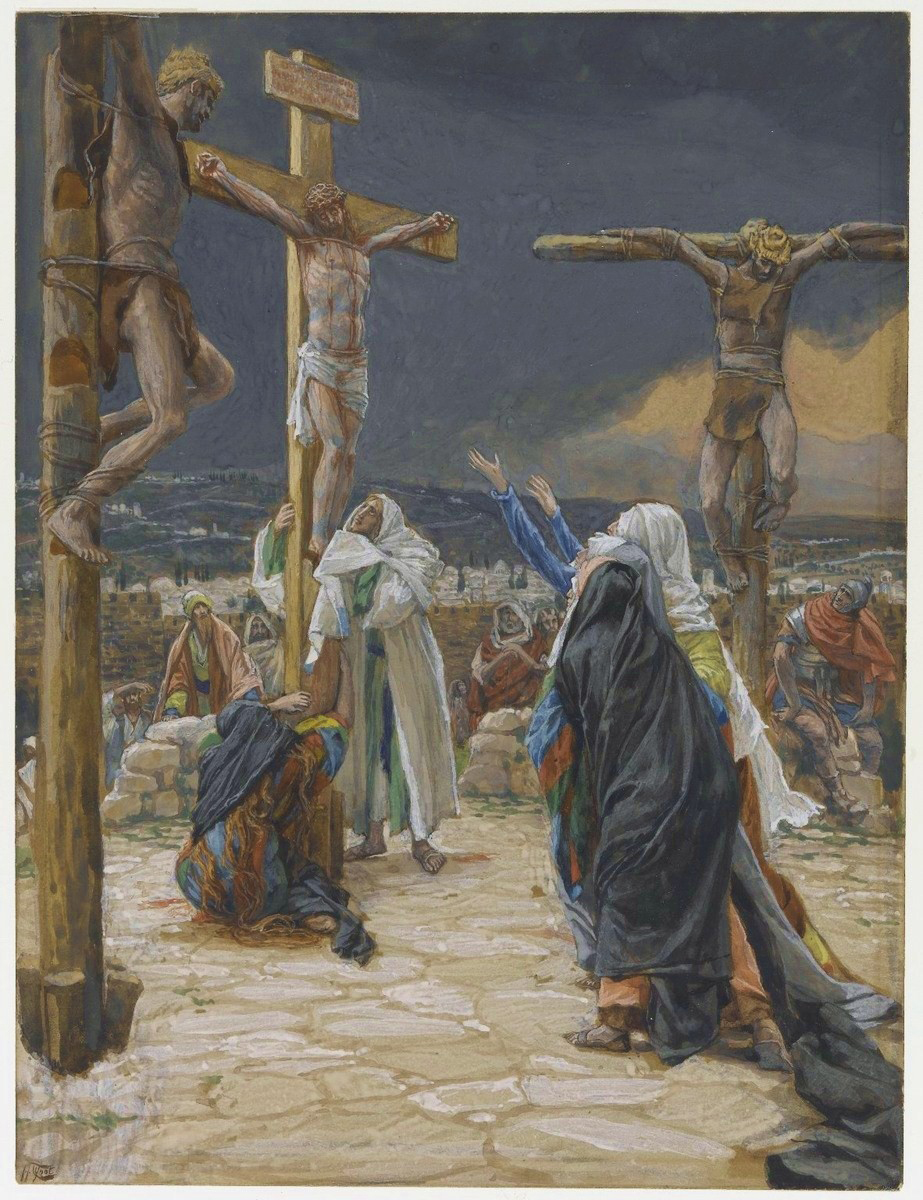 Even upon the cross, Christ reached out in compassion to others. James Tissot, The Death of Jesus.
Even upon the cross, Christ reached out in compassion to others. James Tissot, The Death of Jesus.
After this, I believe He reviewed everything He had promised to do, wanting to be sure that every prophecy concerning His vital mission in mortality had been fulfilled. I wonder if He remembered one more prophecy from Psalms, “And in my thirst they gave me vinegar to drink” (Psalm 69:21). For “Jesus knowing that all things were now accomplished, that the scripture might be fulfilled, saith, I thirst. . . . And they filled a spunge with vinegar . . . and put it to his mouth” (John 19:28–29; emphasis added). Another prophecy fulfilled!
At this point I like to think that in some way—maybe a nod, a smile, an impression—He received the assurance from above that everything was in place, for as the scripture continues, “When Jesus therefore had received the vinegars, He said, It is finished: and he bowed his head, and gave up the ghost” (John 19:30; emphasis added).
To His final mortal breath, He continued to help, to love, to teach, and to show us the way to eternal joy. It is difficult for me not to shed tears of gratitude as I contemplate this moment when His perfect mortal life came to a perfect conclusion.
What should we learn from those final words, “It is finished”? What was finished? His Atonement? His life? His work? He gives us the answer in the nineteenth section of the Doctrine and Covenants: “For behold, I, God, have suffered these things for all, . . . which suffering caused myself, even God, the greatest of all, to tremble because of pain, and to bleed at every pore, and to suffer both body and spirit—and would that I might not drink the bitter cup, and shrink—nevertheless, glory be to the Father, and I partook and finished my preparations unto the children of men” (D&C 19:16, 18–19; emphasis added).
So what was finished? His “preparations unto the children of men.” He did not say everything was finished, but His preparations were, or that chapter of His life was. As the intense drama of possibly the greatest chapter in human history came to a close with those humble yet exultant words “It is finished,” the next chapter was already opening.
Ongoing Voyage
When His spirit left His body, Christ went to the spirit world and continued His work of teaching and helping others: “He organized his forces and appointed messengers, clothed with power and authority, and commissioned them to go forth and carry the light of the gospel to them that were in darkness, even to all the spirits of men” (D&C 138:30).
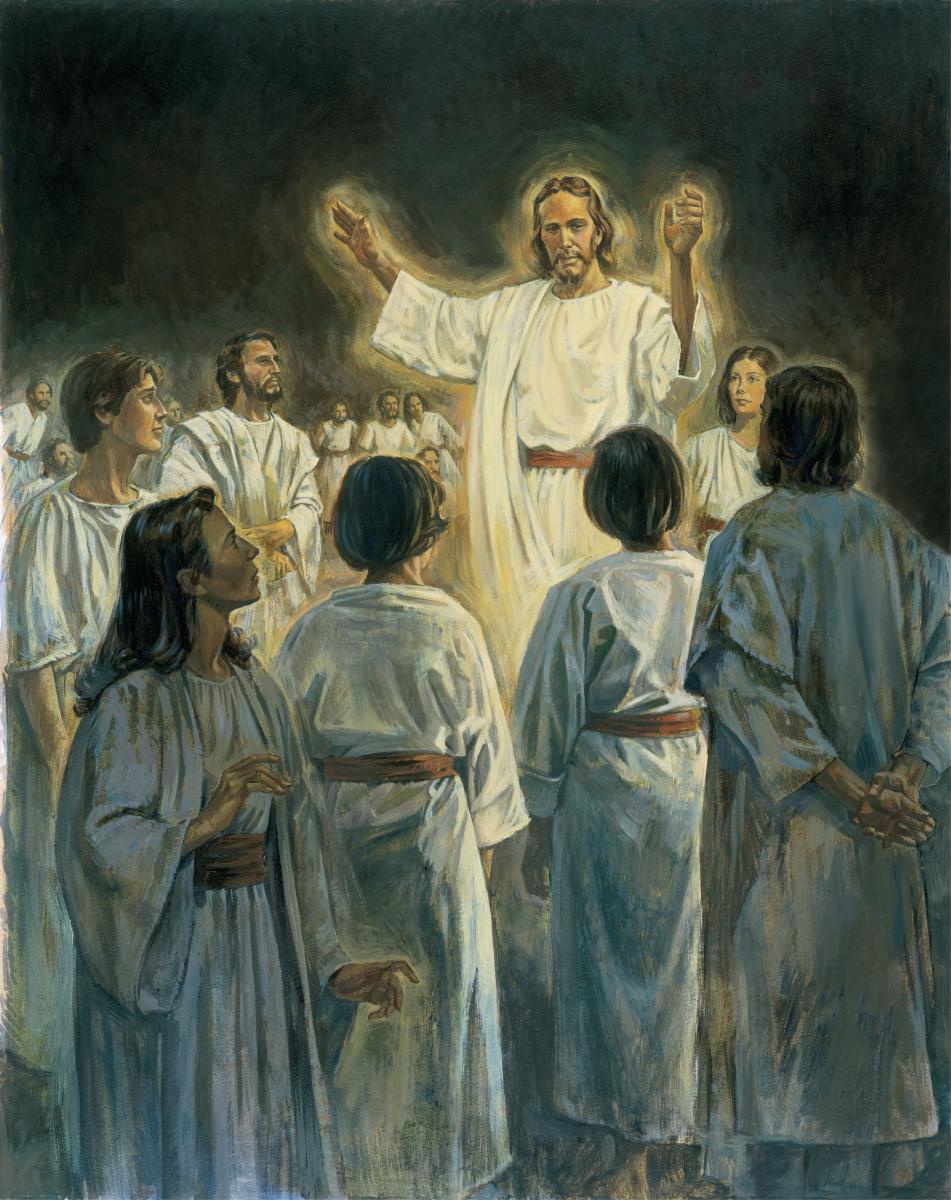 As the chapter in Christ's mortal ministry came to an end, a new chapter began. Robert T. Barrett, Jesus Teaching in the Spirit World.
As the chapter in Christ's mortal ministry came to an end, a new chapter began. Robert T. Barrett, Jesus Teaching in the Spirit World.
Everything Jesus has done, and continues to do, is to help us understand and live eternal truth so we may have eternal joy. Every assignment we receive is an opportunity for us to prepare to serve more effectively. Jesus’ atoning sacrifice and resurrection was not the first chapter in helping us, nor will it be the last. Our birth was not our beginning, nor will our death be our end. All of life’s experiences are chapters to prepare us to better help others.Not only was He personally moving from one chapter to the next, but He was teaching us by word and example that we are to see our assignments as chapters, and understand that as one comes to a close, a new one opens. New chapters await us everywhere, including beyond the grave, for as President Joseph F. Smith saw in vision, “The faithful elders [and sisters] of this dispensation, when they depart from mortal life, continue their labors in the preaching of the gospel of repentance and redemption . . . in the great world of the spirits of the dead” (D&C 138:57).
This principle was emblazoned on my mind and heart years ago when, as a young missionary in Tonga, I often traveled from island to island by sailboat.
Once after preaching for many days on several small islands, we were returning home one morning. We had no motor, no radio, no compass, just a small sail, an experienced captain, and lots of faith. We had hoped to be home that evening, but the wind turned contrary, the seas became rough, and it was obvious we would be on the ocean the rest of the day, through the night, and probably into the next day.
 We had no motor, no radio, no compass, just a small sail, an experienced captain, and lots of faith. (Courtesy of John H. Groberg.)
We had no motor, no radio, no compass, just a small sail, an experienced captain, and lots of faith. (Courtesy of John H. Groberg.)
When night fell, it became cold and dark, and we were jolted and slapped by the heavy waves. I was miserable and couldn’t sleep. When much of the night had passed, I went to visit with the captain. He was holding the main sail rope with one hand and the rudder pole with the other. A feeling of love washed over me as I sensed how intently he was concentrating on bringing us safely through that turbulent ocean.
As we visited, he told me of his deep reverence for God, whom he acknowledged as the Creator of the universe, including the stormy sea we were on. Our visiting was interrupted occasionally when large waves jostled us or strong gusts of wind whipped the sail and tipped us precariously close to the water. I asked if I could do anything to help, but he said he was fine.
We visited until dawn, when we finally entered the calm waters of Pangai Harbor. I marveled at his exquisite mind and astonishing ability. He was humble yet confident. Though he had no compass or radio, his mind, his body, his experience, and his faith in God made our safe return possible.
As we neared the wharf, I thanked the captain and expressed my love and admiration for him. He nodded shyly, but it was easy to tell that he too was grateful for our safe arrival. I threw my belongings over my shoulder, climbed onto the wharf, and looked back at the captain. He was busy bailing cans of bilgewater, cleaning the boat, and getting ready for his next voyage.
Then it came to me: for the captain, that particular voyage was finished, but his journey continued. He had paid attention, brought us home safely, and expanded his level of experience for his coming voyage. Some of those voyages would be smooth, some rough, most normal, but all doable. The same is true of our journey through life. We are to fill our assignments, pay attention, rely on the Lord, bring people home safely, learn from our experiences, and prepare for our next assignment or chapter, regardless of the storms or calms we experience. The work of redemption goes on in one great eternal round—voyage after voyage, assignment after assignment, chapter after chapter—and Jesus is always there to help.
In the hymn “Jesus, Lover of My Soul,” these words of Charles Wesley plead for all of us:
Jesus, lover of my soul,
Let me to thy bosom fly,
While the nearer waters roll,
While the tempest still is high.
Hide me, O my Savior, hide,
Till the storm of life is past.
Safe into the haven guide;
Oh, receive my soul at last.
Other refuge have I none;
Hangs my helpless soul on thee.
Leave, oh, leave me not alone;
Still support and comfort me.
All my trust on thee is stayed;
All my help from thee I bring.
Cover my defenseless head
With the shadow of thy wing. [1]
When we feel His spirit, we feel His joy. We also feel His power and His desire to help us. Everything good comes through diligence and obedience to truth, as explained in this scripture: “Whatever principle of intelligence we attain unto in this life, it will rise with us in the resurrection. And if a person gains more knowledge and intelligence in this life through his diligence and obedience than another, he will have so much the advantage in the world to come” (D&C 130:18–19; emphasis added).
 In the creation of the world, we see God move through chapters.
In the creation of the world, we see God move through chapters.
This process of moving from chapter to chapter and learning from each one is everywhere. For example, think of the creation of this world. The Lord worked hard the first day. When everything was working properly, He pronounced it “good” or “finished” and moved to the next day. He continued day after day with each new assignment until He could pronounce the whole creation “good” or “finished.”
Each day was a preparation for the next one. Who can say which day was the most important? Each day interrelates with and is dependent upon the others. So it is with our lives—our birth, our growth, our assignments, our challenges, our family, our death—all are important and relate to each other. Each chapter is necessary.
Eternal Progression in Families
This same process is at the heart of the most important unit in eternity—the family. When a baby is born, the chapter of birth is finished, but we quickly realize that what was finished was but our preparations for that child. One chapter has closed, the next opened. Now we are parents and have the responsibility to help that child grow and learn and mature and understand. In the next chapter we teach, train, and nurture that child. We will likely start new chapters with other children, but now with more experience. And so it continues, chapter after chapter, round after round.
 Family provides some of the most important chapters in this life. (© Intellectual Reserve, Inc. All rights reserved.)
Family provides some of the most important chapters in this life. (© Intellectual Reserve, Inc. All rights reserved.)
Occasionally I hear people say their family is finished, and I wonder exactly what they mean by this. In a spiritual sense, families are never finished. In a physical sense, there are limitations. The number or gender of children is not a critical factor. Prophets and other righteous people over the ages have had from none to few to many children.
We should not and cannot judge others. Everyone is unique. The process of bringing children into a family involves so many diverse factors of such a deep personal nature that only God can see through it all. He will give the right answers to those who humbly seek His counsel. The most critical factor is counseling with each other and with the Lord through prayer, then following the promptings of His Spirit.
In our day we may think we have control over many of these things, but we must always remember that it is only God who has complete control. It is God to whom we must ultimately report—not a doctor, a parent, a professor, a social worker, or any other mortal. If we put personal limits on following the Savior and the promptings of His Spirit in any way, we put limits on the blessings we can receive from Him.
In this life, for various reasons, some may not be blessed with a “regular” family, but in eternity they will if they continue faithful. God sees beyond the years and the tears of mortality. This life is not about our convenience but about our conversion—that is, our conversion from being a natural man or woman to becoming a man or woman of God by consistently following the promptings of His Spirit. God gives us the opportunity to change from a rather helpless mass of potential to a powerful force for doing good by giving us challenging assignments or chapters to fill. Upon asking, He gives us the help we need, including letting us know when we are ready to move to the next chapter. Peace, progress, and joy come from living according to God’s will, not ours.
Is our responsibility to our children or our family ever finished? A particular chapter may be closed, but the journey never is.
Think of our exemplar, the Savior. Is His work ever finished? He explained to Moses, “I will show thee the workmanship of mine hands; but not all, for my works are without end, and also my words, for they never cease. . . . And as one earth shall pass away, and the heavens thereof even so shall another come; and there is no end to my works, neither to my words” (Moses 1:4, 38; emphasis added).
 The work of the Savior and His creations never cease. (Orion Nebula, NASA/
The work of the Savior and His creations never cease. (Orion Nebula, NASA/
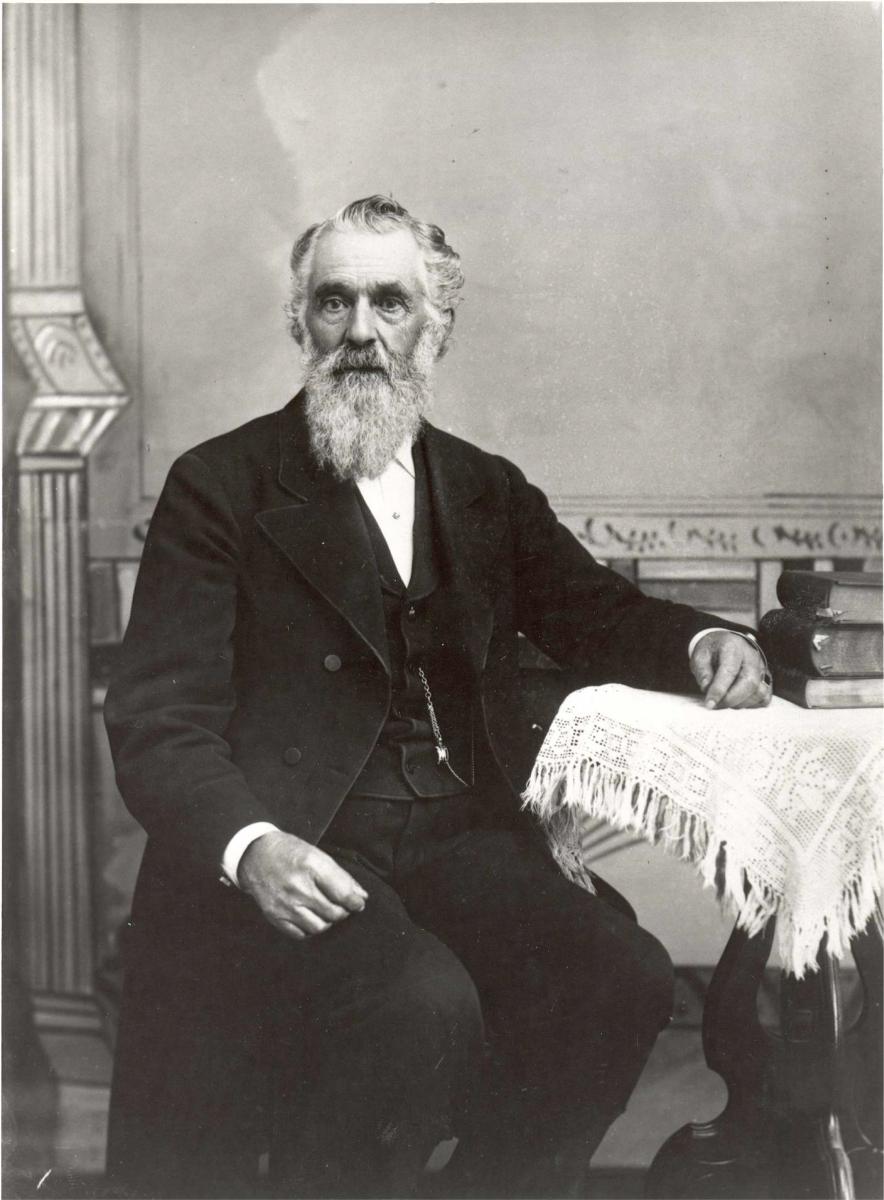 Lorenzo Snow taught important truths about the eternal nature of families. (Courtesy of Church History Museum.)
Lorenzo Snow taught important truths about the eternal nature of families. (Courtesy of Church History Museum.)
When a husband and wife qualify for the celestial kingdom, what is finished? Their preparation to begin a new chapter! President Lorenzo Snow taught this eternal process beautifully:
When two Latter-day Saints are united together in marriage, promises are made to them concerning their offspring that reach from eternity to eternity. They are promised that they shall have the power and the right to govern and control and administer salvation and exaltation and glory to their offspring, worlds without end. . . . What else could man wish? A man and a woman, in the other life, having celestial bodies, free from sickness and disease, glorified and beautified beyond description, standing in the midst of their posterity, governing and controlling them, administering life, exaltation and glory worlds without end. [2]
This new chapter will be glorious but also overwhelming. What a comfort to know that Jesus will always be there to help us! We will not just start building or organizing alone. We will continue to be taught “line upon line, precept upon precept, here a little and there a little” (2 Nephi 28:30; see also D&C 98:12; 128:21). Each chapter has a purpose, and like a great book, each chapter must be read and experienced so we can see and understand the whole story.
Another Chapter
Sometimes we struggle with an assignment or have difficulty getting through just one day, let alone a whole chapter. We may even secretly be glad when a particular assignment is over and hope it never comes again. God understands our feelings, but He also understands our potential and will continue to give us new opportunities that will increase our ability to help others, so long as we recognize them and accept them. We grow from faith to faith, and when we reach our extremities, Jesus says in effect, “I will help you finish that chapter,” much as the angel from heaven strengthened Him in an hour of need in the garden (see Luke 22:43).
 When we struggle with any chapter, there is always help for us. (Carl Heinrich Bloch, Gethsemane, © Intellectual Reserve Inc. All rights reserved.)
When we struggle with any chapter, there is always help for us. (Carl Heinrich Bloch, Gethsemane, © Intellectual Reserve Inc. All rights reserved.)
If we quit on any chapter, we will not see the whole story or be fully prepared for the next one. Or we may have to do makeup work. We need to keep going, even when it hurts. It is not what we say or pray but what we do and sacrifice that “brings forth the blessings of heaven.” [3]
Temple work is a vital part of many chapters. When we understand the eternal nature of temple work, we will make it a bigger part of our lives. The Savior constantly invites us to come unto Him, so just where does He want us to come? To where He is—to His home, the holy temple. I know it pleases Him when we visit Him there often. I also know there is no end to the help we can receive from Him there.
As we move from chapter to chapter, we must learn to turn away from the idols and the idleness of this world and turn to the houses of the Lord and the essential work done there. Time spent in great and spacious buildings filled with the pride of the world yields little of eternal significance. Time spent in buildings filled with the Spirit of the Lord, such as temples, can be great and as spacious and wide as eternity. In them we learn everything and go everywhere of eternal significance, for the Teacher there is the Creator of everything good and eternal. He loves us and wants to help us.
 Temple work is a vital part of many chapters. (Splorticus, Salt Lake Temple, Wikimedia.)
Temple work is a vital part of many chapters. (Splorticus, Salt Lake Temple, Wikimedia.)
Calls and Releases
In addition to teaching us how to faithfully move from one chapter to the next, the Savior’s words “It is finished” also teach us that calls and releases in His kingdom come from those in authority. We do not call or release ourselves, nor do we set the terms of service—God does. Jesus, though in great pain, waited until He was given to know “that all things were . . . accomplished” before He said, “It is finished” (John 19:28, 30). On our level, we must learn to do the same.
Years ago an older gentleman helped me understand this principle. As a young man, he had taken a teaching job in a small Latter-day Saint farming community. There were two major extended families in that area who did not get along. When the stake president called a bishop from one side, the other side stayed home from Church meetings. A year or so later, he called a bishop from the other side, and the first side stayed home.
Before long the stake president called this young schoolteacher who belonged to neither side to be the bishop. He told the stake president he would accept the call if he also could be released in a year or so. To his surprise, the stake president responded, “If you are not a good bishop, I will release you sooner than that. This is a calling from the Lord, not me!”
He became the bishop, prayed, worked hard, and was blessed by the Lord. The family rifts gradually healed, and eventually everyone came back to church. He served as bishop for over fifteen years and then was called to be the stake president. He had a wonderful family and told me he felt his blessings came from serving according to the Lord’s will, not his.
We must all learn this lesson. We do not choose where or how long we will serve. Some people love their missions or other callings so much they would like to stay longer. Others do not like their callings and would like to be released sooner. Only when the Lord, through His leaders, says, “It is finished,” is that chapter over. Only then are we fully ready for the next chapter.
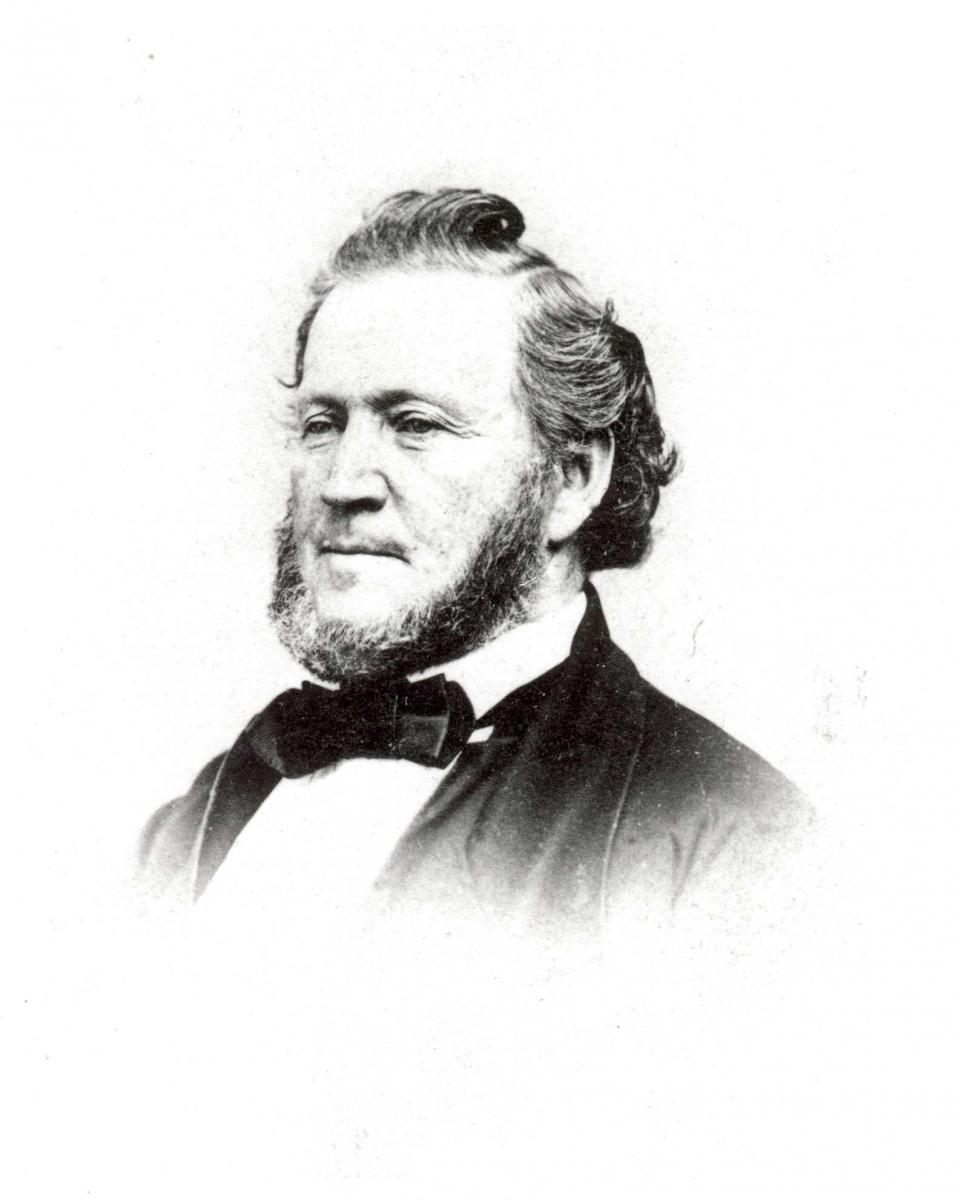 The Lord will direct us, like Brigham Young, to know when we might be ready for the next chapter. (Courtesy of Church History Museum.)
The Lord will direct us, like Brigham Young, to know when we might be ready for the next chapter. (Courtesy of Church History Museum.)
Brigham Young left his family and went on mission after mission and would have kept going, except the Lord said, “My servant Brigham, it is no more required at your hand to leave your family as in times past, for your offering is acceptable to me. I have seen your labor and toil in journeyings for my name. I therefore command you to send my word abroad, and take especial care of your family from this time, henceforth and forever. Amen” (D&C 126:1–3; emphasis added).
The Prophet Joseph Smith moved from chapter to chapter at an astonishing rate. Even though he was hounded and harried, he continued to work hard, wait patiently, and be faithful until the Lord called him home, stating in effect, “Your earthly mission is finished. You are now ready for the next chapter beyond the grave, from where your voice will be heard by millions.”
I marvel at many of the early-day, as well as present-day, brothers and sisters who have faithfully fulfilled difficult assignments and pray we may all do likewise. It is God who determines when to say, “It is finished,” because He understands everything, including our ability and potential, and we do not.
President Thomas S. Monson, the Lord’s mouthpiece on earth today, consistently asks us to follow the Savior’s example by helping those in need in every way we can. Each day becomes like a minichapter and is not fully complete without our helping someone in some way.
As we do things that require faith in the Lord, our faith in Him increases. We may not want to do some things, but if we sincerely try, He makes it possible for us to accomplish every assignment—be it building a boat, getting some brass plates, having a child, filling a calling, caring for someone with emotional or physical challenges, settling differences, overcoming anger, or any other difficult chapter. Remember that every act of love given, every sacrifice made by us, and every assignment fulfilled is but a tiny reflection of the Savior’s unending love, sacrifice, and help.
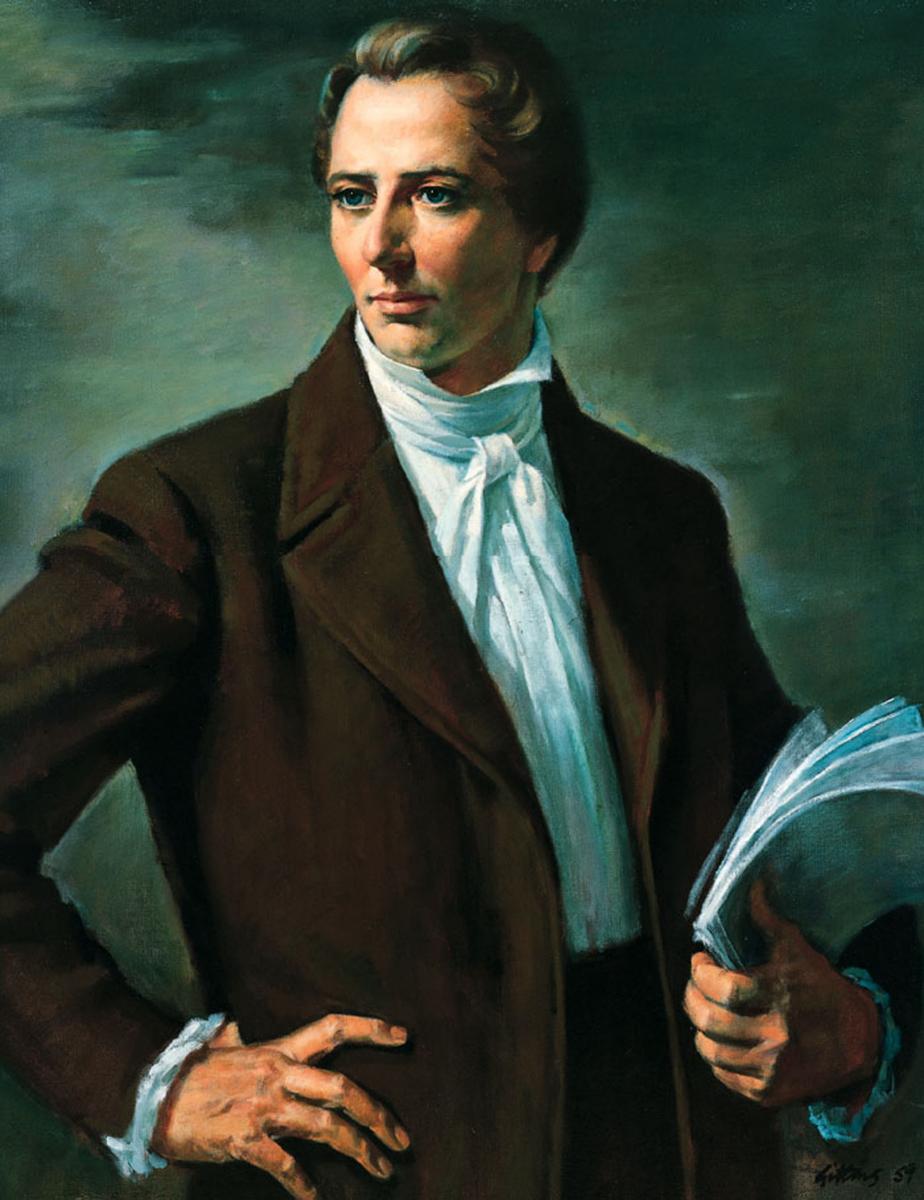 The Prophet Joseph Smith. (Alvin Gittins, © Intellectual Reserve, Inc. All rights reserved.)
The Prophet Joseph Smith. (Alvin Gittins, © Intellectual Reserve, Inc. All rights reserved.)
Whenever I question the length or difficulty of any assignment, I try to remember the Savior hanging on the cross in great pain, yet continuing to help others until He received the assurance from above that His mortal mission was complete. Only then did He say, “It is finished.” In the greatest act of love and sacrifice ever performed, Jesus defeated all the forces of evil and wrought an Atonement and a Resurrection for the eternal benefit and joy of all mankind. What an example! I pray that each of us, like the Savior, will accept every assignment or chapter offered us and continue faithful in it until someone in authority says, “It is finished.”
As we move from chapter to chapter, we become better prepared and able to do what President Monson so sincerely and consistently asks us to do—help those in need in every possible way. As we live by the Savior’s words, we show our love and gratitude for Him and stay firmly on the path to becoming more like Him and eventually becoming perfect in Him!
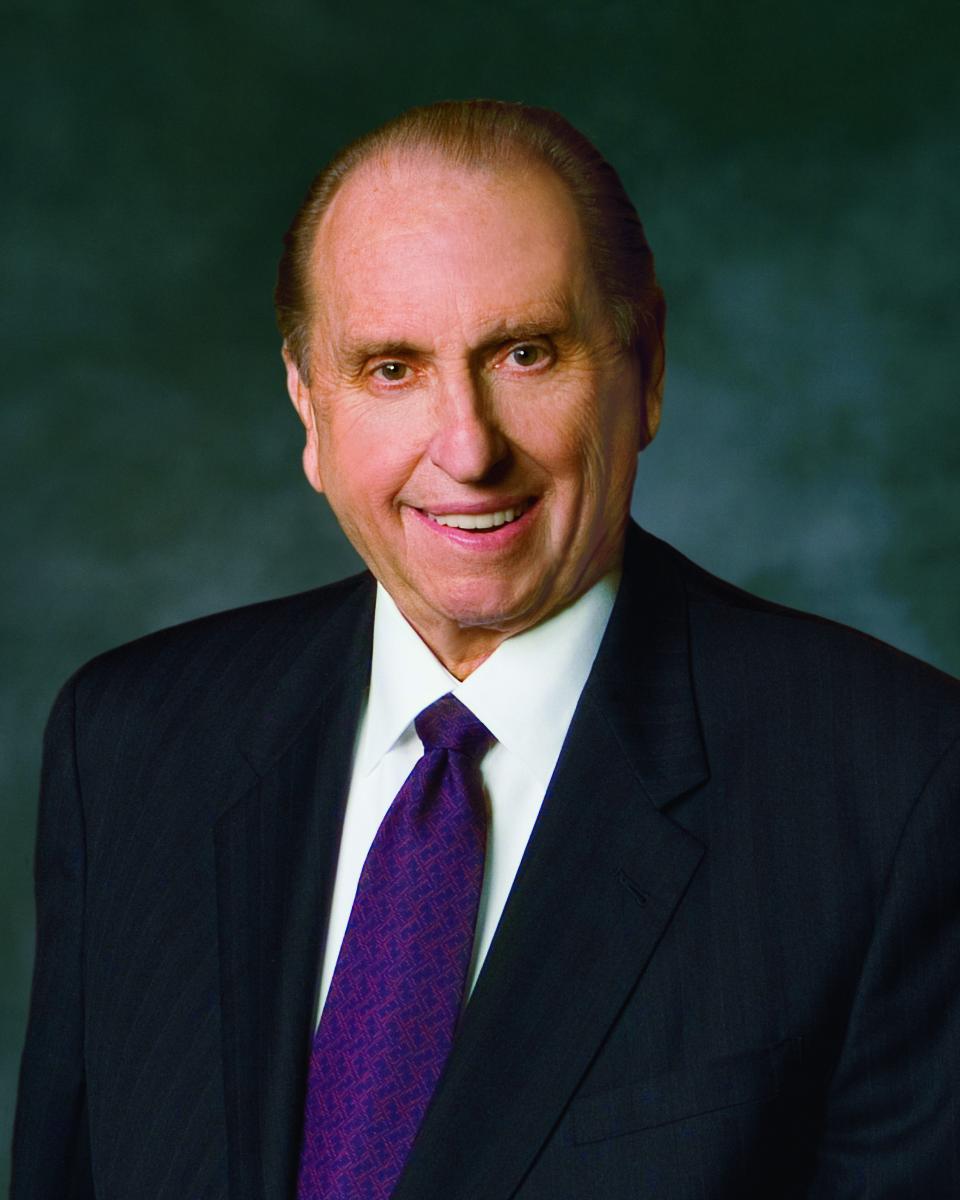 President Thomas S. Monson. (© Intellectual Reserve, Inc. All rights reserved.)
President Thomas S. Monson. (© Intellectual Reserve, Inc. All rights reserved.)
I testify that Jesus lives, that He loves us, that He helps us, that He is at home in His temple, and that He is our Friend. I testify that Joseph Smith is the prophet of the Restoration and that Thomas S. Monson is God’s mouthpiece on the earth today. I testify that Jesus lives, that He loves us, that He helps us, that He is at home in His temple, and that He is our Friend who helps us forever.
 (Photograph by Craig Dimond, © Intellectual Reserve, Inc. All rights reserved.)
(Photograph by Craig Dimond, © Intellectual Reserve, Inc. All rights reserved.)
Notes
[1] Charles Wesley, “Jesus, Lover of My Soul,” Hymns (Salt Lake City: The Church of Jesus Christ of Latter-day Saints, 1985), no. 102.
[2] Lorenzo Snow, Deseret Weekly News, April 3, 1897, 481.
[3] William W. Phelps, “Praise to the Man,” Hymns, no. 27.
